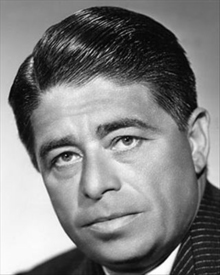Alfred Newman
Info
New Haven, Connecticut
02/17/1970
Hollywood, California
USA
20th Century
Film/Television Music
Biography
Alfred Newman was the eldest of 10 children in a poor family. His family recognized his interest in music at an early age and he walked 10 miles every day to practice on a piano belonging to a friend of his mother's. Arguably a child prodigy, he favored works by Ludvig van Beethoven and Frédéric Chopin. He earned money from recitals and also played in theatres and restaurants before getting a job as an accompanist to Grace La Rue in her vaudeville act billed as "the Marvelous Boy Pianist." By age 20, Newman became friends with George Gershwin leading to his conducting some ofGeorge and Ira Gershwin's stage musicals including Treasure Girl and Funny Face. He also conducted many other stage works including Rogers & Hart's Spring is Here and Heads Up, andJerome Kern's Criss Cross. He also contributed occasional songs to these musicals.
Main Works
Film Scores:
Street Scene (1931)
The Prisoner of Zenda (1937 & 1952)
Alexander's Ragtime Band (1938) - Oscar Winner
Beau Geste (1939)
The Hunchback of Notre Dame (1939)
Gunga Din (1939)
Wuthering Heights (1939)
Drums Along the Mohawk (1939)
Tin Pan Alley (1940) - Oscar Winner
The Mark of Zorro - 1940 & 1952 (and 1974 TV theme)
How Green Was My Valley (1941)
The Song of Bernadette (1943) - Oscar Winner
Mother Wore Tights (1947) - Oscar Winner
Cry of the City (1948)All About Eve (1950)
With a Song in My Heart (1952) - Oscar Winner
How to Marry a Millionaire (1953)
The Robe (1953)
The Seven Year Itch (1955)
Love Is a Many-Splendored Thing (1955) - Oscar Winner
Anastasia (1956)
The Diary of Anne Frank (1959)
How the West Was Won (1962)
The Greatest Story ever Told (1965)
Airport (1970)
Conductor/Musical Director:
City Lights (1931) - Musical Director
The Grapes of Wrath (1940) - Musical Director
Miracle on 34th Street (1947) - Musical Director
Call Me Madam (1953) - Music Supervisor & Musical Director - Oscar Winner
There's No Business Like Show Business (1954) - Conductor & Music Supervisor
The King and I (1956) - Conductor & Music Supervisor - Oscar Winner
Carousel (1956) - Conductor & Music Supervisor
South Pacific (1958) - Music Supervisor & Orchestrator
Flower Drum Song (1961) - Conductor & Music Supervisor
State Fair (1962) - Musical Director
Camelot (1967) - Conductor & Music Supervisor - Oscar Winner


